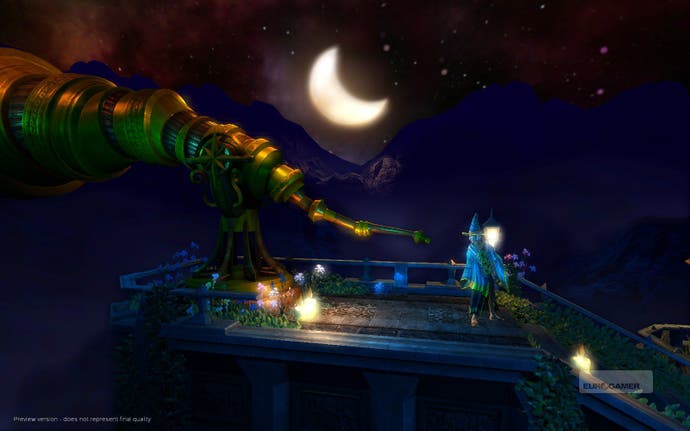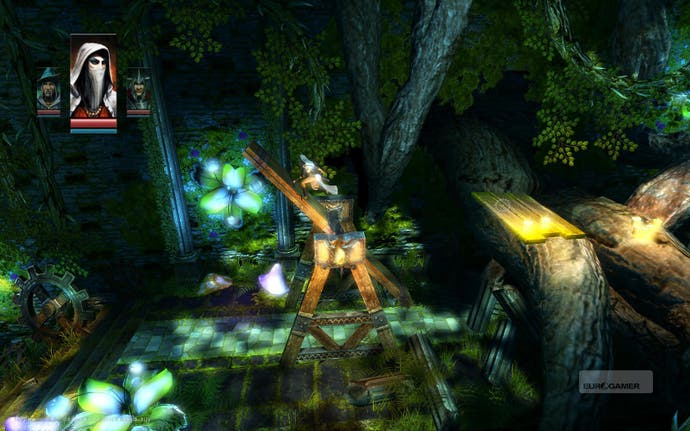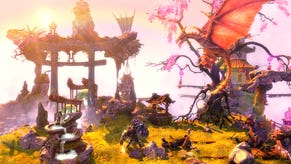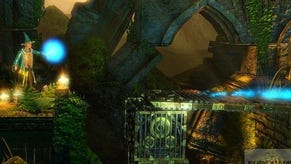Trine
Three become one.
Trine is where Lost Vikings and Golden Axe merge and come up against the dreaded scourge of gaming: seesaws. Whether they're hampering the progress of Gordon Freeman's ascent to a platform that's slightly too high, or causing Sackboy to leap futilely at their teetering ends, they've been causing a ruckus in our chosen field of entertainment for several years now. One day their reign of tyranny will be overthrown by another piece of playground apparatus (my bet's on those miniature horses on chunky metal springs) but until then it's up to a svelte thief, a lady-chasing wizard and an angry knight to wrestle with their noxious taint.
First impressions of Trine are twofold. Firstly the art style is unremittingly gorgeous; initially rather non-imposing, but increasingly packed full of golden steampunk-ish whirring cogs and gears, crystalline stalagmites and beautiful background relief carvings. Secondly, it's all a bit King Rollo. As you play through the introductions to each character and get to grips with their particular gameplay nuances the warm tones of a Bernard Cribbins/Richard Briers-type narrator fleshes out the background by giving the characters lines like "By my trousers! I must escape!" and telling the cheery tale of a country turned sour by the presence of the walking dead.
At its roots Trine is a side-scrolling physics-obsessed platformer, but one with a fair amount of secret stuff up in the rafters once you've manipulated yourself up there, and three characters that share a collective love of running left, running right and jumping. With either console thumbstick-manoeuvring or PC mouse pointing, however, each character has their own individual traits. Master thief Zoya is the most fun of the threesome to control, nimbly leaping hither and thither, and is armed with a grappling hook you can fire at the scenery and swing around on, and can protect herself though the use of a bow and arrow. Pontius the knight, meanwhile, is best at smashing his way through the undead horde and has a shield that you can angle around him to protect from falling masonry and triggered fireballs.

Most interesting of all, however, is Amadeus the wizard, who can push, pull and levitate physics objects around the level. What's more, if you draw a square with the magic cursor then, much in the manner of Crayon Physics, Amadeus can conjure up a whirring clockwork cube that can be used to solve nearby physical mystery - much to the distress of rival Salieri, who is yet to master polygons. If you jump on top of said cube, or anything tied to gravity, you can then hover around the level - doing your utmost avoid unbalancing it and having your wizard friend teeter and fall off.
The MacGuffin of the piece is a magical item that lured your three characters into the opening riches-packed dungeon and there, in the darkness, bound them. Meaning that, as in Blizzard's now-ancient Lost Vikings, you can swap between them at will - all pleasantly bickering in the same crowded headspace in an entirely Jackanory fashion. If one of them dies then you're stuck with the others until you come across an orb helpfully placed to revive your other selves, while experience shards placed in both hard-to-reach areas around the level and skeleton-warrior ribcages allow you to improve the capabilities of your charges. No-nonsense warrior Pontius, for example, progresses through flaming swords and lightning-imbued storm hammers which, as the press material supplied with Trine preview code solemnly informs, kill both bats and spiders.
If there were a single touchstone for Trine, it would be LittleBigPlanet - albeit with a telekinetic edge. There's a whole lot of swinging going on. Huge golden trolley systems with giant stone fists attached sway tellingly next to fragile-looking walls, and waterwheels revolve at the tops of screens demanding a swift coupling with the thief's grappling hook. It really is a world as puzzlingly satisfying as it is pleasing to stare at in a transfixed fashion.

Quite whether the game can keep it up over 16 levels is another matter entirely, especially when the story laid out in its earlier parts is pleasant in its childhood echo but also as generic as it gets. Then again the general puzzling cleverness of the affair may well overcome - the multiple ways in which separate characters can get past the same physical set-ups is quite the epitome of nifty design. Indeed, the fact that the same puzzles can often be dealt with by different characters in different ways will no doubt add buckets of gameplay to the promised co-op. In this the Knight will be able to throw the crates his buddies are standing on, the Wizard will levitate platforms that the Thief can dangle from and the like. There's a whole world of friendly platforming fun waiting to be charmingly narrated.
There's no doubt that the Henry's Cat storytelling and the simple satisfaction of crushing the undead with hastily drawn magical boxes combine to make a simple yet beautifully immersive game. The word 'lovely' is rarely used in games journalism, for many good reasons, but the only facet of loveliness that Trine doesn't have covered is that it won't have the scent of freshly cut flowers. Can loveliness win out in the battle between gaming and seesaws though? Come July we'll find out whether gaming will ever overthrow their vicious regime, or whether it will, er, die Trine. Sorry.
Trine is due out for PC and PlayStation 3 via PSN in July.




